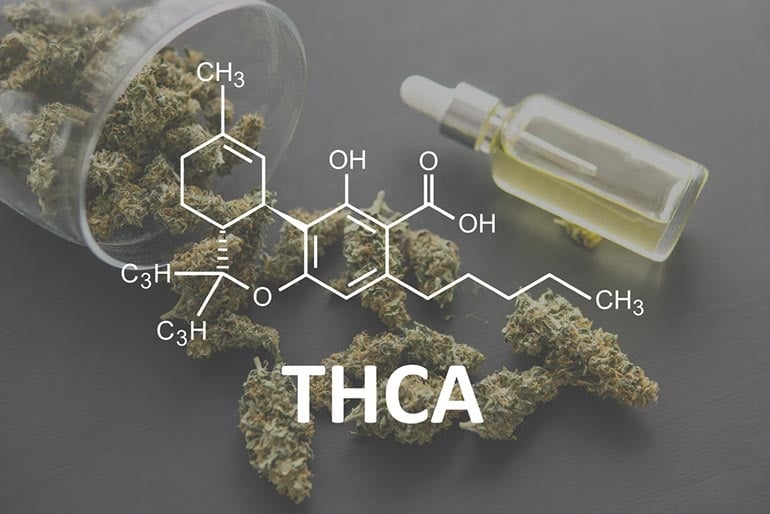Start 14-Day Trial Subscription
*No credit card required

What Is THCa and What Does It Do? The Difference Between THCa and THC
Unlock the secrets of THCa – the non-psychoactive precursor to THC in cannabis. Discover its unique characteristics, conversion process and potential health benefits. Whether you're seeking therapeutic relief or recreational enjoyment, make informed choices with our comprehensive guide on THCa vs THC.
The Decarboxylation Process
The transformation from THCa to THC is known as decarboxylation. During this chemical reaction, THCa loses a carboxyl group (COOH), which is essentially a molecule made up of carbon, oxygen, and hydrogen. This loss occurs when the compound is exposed to heat, either through burning, vaping, or cooking.
Heat Is the Catalyst
The key to this transformation is heat. Decarboxylation typically begins at temperatures around 220 degrees Fahrenheit (104 degrees Celsius), although it can start at lower temperatures over a longer period. The exact temperature and duration needed for optimal decarboxylation can vary, but the goal is to activate THC without degrading it.
Methods of Heating:
- Smoking or Vaping: This is the most immediate method of converting THCa to THC. The high temperatures involved in smoking or vaping instantly decarboxylate THCa. This rapid conversion is why effects are felt almost immediately when cannabis is smoked.
- Cooking or Baking: When making cannabis edibles, the dried cannabis is often heated or decarboxylated before being combined with food. This process ensures that THCa is converted into the psychoactive THC, which then produces the desired effects when consumed. The temperature and duration of cooking need to be carefully controlled to prevent degradation of the THC.
- Curing and Aging: Even during the curing and aging process post-harvest, a slow natural decarboxylation can occur. However, this process is much less efficient than active heating, and results in a much lower THC yield.
Temperature and Time Considerations
The efficiency of converting THCa to THC depends greatly on the temperature and the duration of exposure. Lower temperatures require a longer time to achieve full decarboxylation, while higher temperatures can speed up the process but risk degrading the THC into less desirable compounds.
Partial Conversion Reality
In practice, achieving 100% conversion of THCa to THC is rare. Typically, cannabis products will contain a mix of both THCa and THC, with the ratios varying based on the method of preparation and consumption.
Importance of Decarboxylation
For users seeking the psychoactive effects of THC, understanding and controlling the decarboxylation process is crucial. It's not just about achieving a high; it's also about harnessing the potential therapeutic benefits of THC, which differ from those of THCa.
The conversion of THCa to THC is a complex but fundamental aspect of cannabis chemistry. It underscores the importance of preparation and consumption methods in determining the effects of cannabis.
Whether for recreational or medicinal purposes, understanding this process helps users tailor their cannabis experience to their specific needs and expectations.
THCa and THC: What are the Medical Benefits?
The medical benefits of THCa and THC are different due to their different chemical properties and effects on the body.
THCa's Medical Benefits:
- Anti-Inflammatory Properties: THCa has been identified for its potential to reduce inflammation, which could be beneficial for conditions like arthritis and other inflammatory disorders. It does so by having the potential to inhibit key inflammatory pathways in the body.
- Neuroprotective Effects: Preliminary research suggests that THCa may protect brain cells, which is promising for treating neurodegenerative diseases like Parkinson's, Alzheimer's and multiple sclerosis. These effects are thought to be linked to THCa's ability to modulate cellular processes involved in neurodegeneration.
- Anti-Nausea and Anti-Emetic Effects: For patients undergoing treatments like chemotherapy, THCa has demonstrated properties that can reduce nausea and vomiting, offering a non-psychoactive alternative to THC for these symptoms.
- Anti-Proliferative Properties: Early-stage research into THCa's role in cancer treatment is promising due to its potential to inhibit the growth of cancer cells, particularly noted in prostate cancer.
- Analgesic Properties: Some studies suggest THCa has pain-relieving properties, which could be significant for those seeking pain relief without the psychoactive effects of THC.
- Supporting Immune Function: While still under research, THCa's anti-inflammatory and other health-promoting properties suggest it might aid in maintaining a healthy immune response.
THC's Medical Benefits:
- Pain Relief: THC is effective in managing various types of pain, including neuropathic, inflammatory and pain related to conditions like fibromyalgia and endometriosis.
- Appetite Stimulation: THC can stimulate appetite, which is beneficial for patients with appetite loss due to medical treatments or conditions like HIV/AIDS.
- Anti-Nausea Effects: THC reduces nausea and vomiting, particularly as a side effect of chemotherapy.
- Sleep Aid: THC has sedative effects that can help with insomnia or other sleep disorders, aiding in regulating sleep patterns and inducing sleep.
- Mental Health Benefits: THC may alleviate symptoms of anxiety and depression for some individuals, though it can exacerbate these conditions in others, particularly at higher doses or in those with a predisposition to mental health disorders.
Both THCa and THC offer a range of potential medical benefits. However, their use must be approached carefully, especially in THC due to its psychoactive effects.



